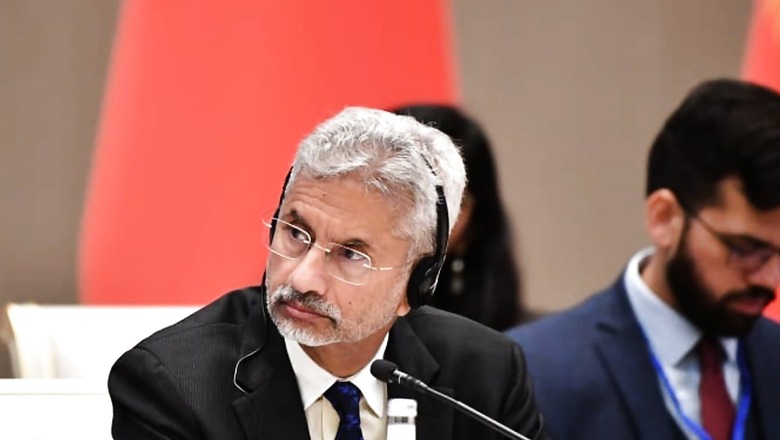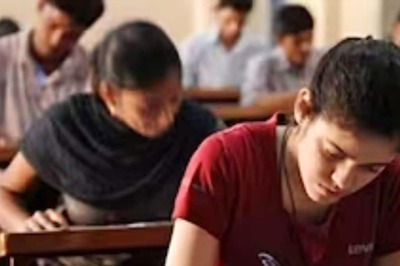
views
External Affairs Minister S Jaishankar has met South Korea’s top leadership and called for expanding India’s strategic partnership in new areas like critical and emerging technologies, semiconductors and green hydrogen to make the bilateral ties more contemporary. Jaishankar said this as he co-chaired the 10th India-South Korea Joint Commission Meeting (JCM) with his counterpart Cho Tae-yul in Seoul.
He said the two sides held a comprehensive and productive discussion on cooperation in the fields of defence, science and technology and trade. “Co-chaired with @FMChoTae_yul a comprehensive and productive 10th India-South Korea Joint Commission Meeting in Seoul today,” Jaishankar posted on X.
The conversations covered the expanded bilateral ties, cooperation in the field of defence, science and technology, business and trade, people-to-people exchange and cultural cooperation, he said. “Also spoke of advancing trilateral cooperation. Exchanged views on the developments in the Indo-Pacific, our convergences to challenges in the region and regional & global issues of mutual interest,” Jaishankar posted on X. In his opening remarks, Jaishankar said that during Prime Minister Narendra Modi’s visit to South Korea in 2015 the bilateral relations were elevated to a special strategic partnership.
“It is important that we live up to that. We have grown from strength to strength in the years that have passed. We have become truly important partners for each other and our bilateral exchanges, trade, investments, defence and science and technology cooperation have all seen a steady growth while keeping up the momentum in the traditional areas of cooperation,” the minister said. “We would be very much interested now in expanding into new areas, such as critical and emerging technologies, semiconductors, green hydrogen, human resource mobility, nuclear cooperation, supply chain resilience, etc to make our ties more contemporary,” he said.
The JCM was attended by representatives from many ministries and departments in the two governments. It provided the platform for a comprehensive review of bilateral cooperation under the India-Republic of Korea Special Strategic Partnership in areas of trade, investments, development cooperation, defence and security, science and technology, culture and people-to-people exchange, the Ministry of External Affairs said in a statement. The two ministers also explored ways to further extend cooperation to new areas such as critical and emerging technologies, semiconductors, green hydrogen, human resource mobility and resilient supply chains, working both bilaterally and together with other countries, it said.
The discussions also covered developments of common interest and concern in the shared Indo-Pacific region. They also shared perspectives on their respective Indo-Pacific visions and strategies and noted the commonality in their initiatives for the region, the statement said. Jaishankar said the two nations witnessed a growing convergence of their views in the international fora.
“The focus on the Indo-Pacific region is good case to point, and we both have stakes and its stability, security and prosperity,” he said. Jaishankar said he approached the joint commission with a great deal of optimism and expectation.
“I know there is enormous goodwill between us. Our challenge is to translate that into practical outcomes,” he said. “Our leaders met twice last year in Hiroshima and New Delhi. I think their discussions have provided us the guidance to go forward,” he added.
He also congratulated Cho for his appointment as foreign minister in December. “So let me offer my best wishes for your successful tenure,” he said.
Jaishankar’s visit also allowed age-old civilisational and cultural ties between the two countries to be cherished. He met a delegation led by the Mayor of Gimhae City, Sister City of Ayodhya. India shares an ancient bond of kinship with the Korean people, manifested by Princess Suriratna from Ayodhya, who is known as Queen Heo Hwang-ok in South Korea, the statement said. “The Gimhae- Ayodhya connect is a testament to our shared cultural heritage and longstanding people-to-people relations,” Jaishankar said.
According to Korean legend, the teenage princess from Ayodhya crossed the ocean in a boat some 2,000 years ago, sailed 4,500 kilometres to Korea and married King Kim Suro who founded the Gaya Kingdom in the north Asian country. Jaishankar also received from the revered Monk Domyung a book penned by him on Korea’s historical and cultural association with ancient India and Buddhism. He also visited a special exhibition showcasing India’s rich Buddhist heritage at the prestigious National Museum of Korea.
“Pleased to receive the book Gaya Buddhism, Unlatching the Gate’ from Ven. Monk Domyeong, Chief Abbot of Yeo Yeo Jung Sa. Appreciate his interest in our cultural legacy and historical traditions.,” Jaishankar posted on X. He also held a good conversation with representatives of the Indian Chamber of Commerce in Korea.
“Urged them to further strengthen the business bridge between India and South Korea,” he said. Jaishankar was in Seoul on the first leg of his four-day visit to South Korea and Japan.
His visit to South Korea, soon after our countries celebrated the 50th anniversary of the establishment of our diplomatic relations, provided an opportunity to create new pathways to further strengthen the Special Strategic Partnership between the two countries, the MEA statement said. During his visit, he interacted with many Korean dignitaries and a wide range of interlocutors from all walks of life in South Korea.
He called on Prime Minister Han Duck-soo, and had meetings with Minister of Trade, Industry & Energy Ahn Dukgeun, and Director of National Security Office Chang Ho-jin. He held an interactive discussion with heads of Korean think tanks, academics, business and the Indian Diaspora, sharing views on India’s development, foreign policy and potential and prospects for bilateral relations.
He also delivered a speech at Korea’s National Diplomatic Academy on the theme of “Broadening horizons: India and Korea in the Indo-Pacific, demonstrating how India and South Korea can work together for peace and prosperity in the Indo-Pacific region and beyond by building supply chain resilience, leveraging complementary technology strengths, and linking geographies through connectivity.



















Comments
0 comment